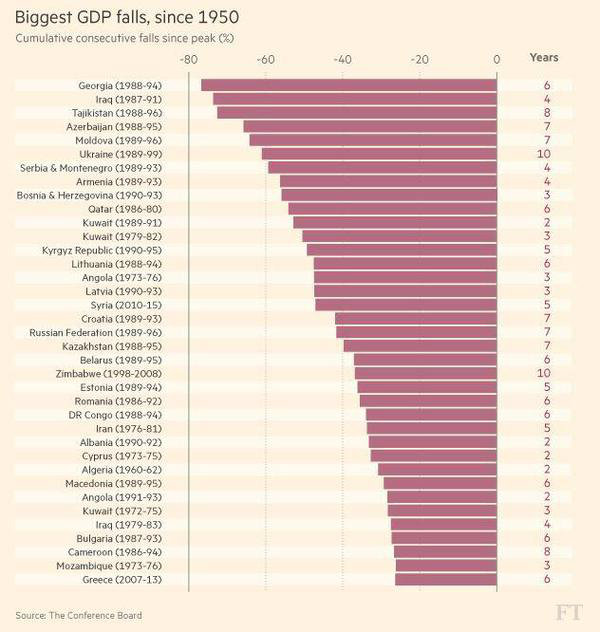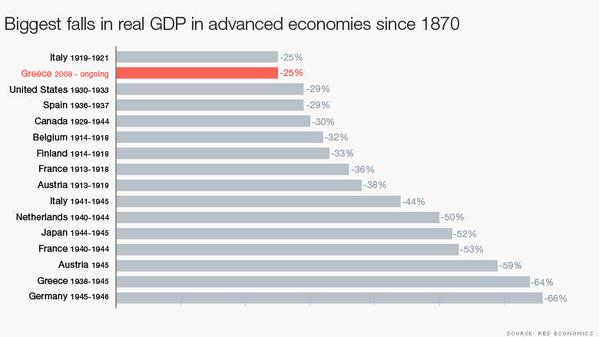Summary:
In my last post, I pointed out that Greece's current depression is by no means the worst since World War II, as is often stated, and that the US's Great Depression was not the worst depression in history either. For reference, I'm putting up Tony Tassell's chart again.I'm frankly appalled by the comments on that post. The arguments used to justify the prevailing views amount to the following.1. The other countries in the list aren't rich Western countries, so they don't count.Eh???2. Depression in a time of war isn't really depression.I doubt if the people of Syria would agree with this. However, in support of this point (and taking into account point 1), Christos Savva kindly provides this chart:What this chart shows us is that the two World Wars were bad for the GDP of Western countries, and REALLY bad for the GDP of the countries on the losing side. So if you want to avoid a really bad depression, make sure you always win wars. Unless you are America. So, if we remove non-Western countries (point 1) and countries involved in wars (point 2), we are left with - what? Oh look, Greece and the US. Or, in Chart 1, just Greece (since the depressions in the Baltics and Bulgaria happened before they joined the rich Western European club). How remarkable.
Topics:
Frances Coppola considers the following as important: depression, Greece, US, war
This could be interesting, too:
In my last post, I pointed out that Greece's current depression is by no means the worst since World War II, as is often stated, and that the US's Great Depression was not the worst depression in history either. For reference, I'm putting up Tony Tassell's chart again.In my last post, I pointed out that Greece's current depression is by no means the worst since World War II, as is often stated, and that the US's Great Depression was not the worst depression in history either. For reference, I'm putting up Tony Tassell's chart again.I'm frankly appalled by the comments on that post. The arguments used to justify the prevailing views amount to the following.1. The other countries in the list aren't rich Western countries, so they don't count.Eh???2. Depression in a time of war isn't really depression.I doubt if the people of Syria would agree with this. However, in support of this point (and taking into account point 1), Christos Savva kindly provides this chart:What this chart shows us is that the two World Wars were bad for the GDP of Western countries, and REALLY bad for the GDP of the countries on the losing side. So if you want to avoid a really bad depression, make sure you always win wars. Unless you are America. So, if we remove non-Western countries (point 1) and countries involved in wars (point 2), we are left with - what? Oh look, Greece and the US. Or, in Chart 1, just Greece (since the depressions in the Baltics and Bulgaria happened before they joined the rich Western European club). How remarkable.
Topics:
Frances Coppola considers the following as important: depression, Greece, US, war
This could be interesting, too:
Robert Skidelsky writes Lord Skidelsky to ask His Majesty’s Government what is their policy with regard to the Ukraine war following the new policy of the government of the United States of America.
Robert Skidelsky writes House of Lords Speech – Ukraine: “A wake up call” (International Relations and Defence Committee Report)
Robert Skidelsky writes The American Conservative – Why Is the UK So Invested in the Russia–Ukraine War?
Robert Skidelsky writes The American Conservative: Skidelsky on Russia, Ukraine and the Future of European Security
I'm frankly appalled by the comments on that post. The arguments used to justify the prevailing views amount to the following.
1. The other countries in the list aren't rich Western countries, so they don't count.
Eh???
2. Depression in a time of war isn't really depression.
I doubt if the people of Syria would agree with this.
However, in support of this point (and taking into account point 1), Christos Savva kindly provides this chart:
What this chart shows us is that the two World Wars were bad for the GDP of Western countries, and REALLY bad for the GDP of the countries on the losing side. So if you want to avoid a really bad depression, make sure you always win wars. Unless you are America.
So, if we remove non-Western countries (point 1) and countries involved in wars (point 2), we are left with - what? Oh look, Greece and the US. Or, in Chart 1, just Greece (since the depressions in the Baltics and Bulgaria happened before they joined the rich Western European club). How remarkable.
But what is all this about "war doesn't count"? Seriously, Point 3 was actually made in a comment on my last post (though I am paraphrasing, of course):
3. Depressions caused by political decisions are worse than depressions caused by wars.
Presumably this means "morally worse", not actually worse. GDP falls are clearly far greater when war is involved.
I find this morally inexcusable. War is a political decision. How is a political decision that results in depression worse than a political decision that results in war?
Wars cause depression through killing people and destroying property. "Political decisions" that cause depression also kill people and destroy property, just more slowly and with lots of excuses about "this will be good for you in the long run". And all too often, depression leads to war, just as war causes depression.
So we should rewrite point 3 thus:
3. Depressions caused by some political decisions are worse than depressions caused by other political decisions. Even when they aren't.
But this is utterly illogical. Reason seems to have departed.
"Ah well," say some commenters, "the US's Depression was the longest and deepest PEACETIME depression". (Though Greece may overtake it soon.)
But what does "peace" mean, when banks are used as weapons? What is the difference between imposing sanctions on Russia, which restrict financial and trade flows, and forcing closure of Greek banks and imposition of capital controls, which restrict financial and trade flows? Both are a form of siege. Using military force to cut supply lines or seize resources is an outright act of war - though we often turn a blind eye even to this, as we did in Czechoslovakia in 1968 and Weimar in 1923. Sanctions are economic warfare, though we like to pretend we are not actually at war with the countries concerned. But restricting liquidity to Greece's banks is a peacetime activity, apparently. I'm sorry, but I see little difference. The effects are the same.
If Greece's depression is in "peacetime", would someone please define "peace"?


